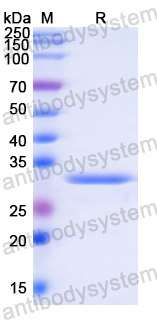Catalog No.
YHG32101
Expression system
E. coli
Species
Homo sapiens (Human)
Protein length
Ile781-Cys1025
Predicted molecular weight
29.26 kDa
Nature
Recombinant
Endotoxin level
Please contact with the lab for this information.
Purity
>90% as determined by SDS-PAGE.
Accession
Q12882
Applications
ELISA, Immunogen, SDS-PAGE, WB, Bioactivity testing in progress
Form
Lyophilized
Storage buffer
Lyophilized from a solution in PBS pH 7.4, 0.02% NLS, 1mM EDTA, 4% Trehalose, 1% Mannitol.
Reconstitution
Reconstitute in sterile water for a stock solution. A copy of datasheet will be provided with the products, please refer to it for details.
Shipping
In general, proteins are provided as lyophilized powder/frozen liquid. They are shipped out with dry ice/blue ice unless customers require otherwise.
Stability and Storage
Use a manual defrost freezer and avoid repeated freeze thaw cycles. Store at 2 to 8°C for frequent use. Store at -20 to -80°C for twelve months from the date of receipt.
Alternative Names
Dihydropyrimidine dehydrogenase [NADP(+)], DPYD, DPD, Dihydrouracil dehydrogenase, Dihydrothymine dehydrogenase, DHPDHase
Differential expression of capecitabine-related metabolic enzymes in hepatocellular carcinoma and its clinical value: a retrospective cohort study., PMID:40504344
Human xenobiotic metabolism proteins have full-length and split homologs in the gut microbiome., PMID:40482059
Pharmacogenetic Profiling of Genes Associated with Outcomes of Chemotherapy in Omani Healthy Controls., PMID:40428413
Liquid biopsy-derived extracellular vesicle protein biomarkers for diagnosis and prognostic assessment of lung squamous cell carcinoma., PMID:40275246
Integrating network pharmacology and experimental validation to uncover the synergistic effects of Huangqi ()-Ezhu () with 5-fluorouracil in colorectal cancer models., PMID:40151125
Case report: Chemotherapy plus sintilimab for the treatment of gastroesophageal junction hepatoid adenocarcinoma with liver metastasis: a case study with literature review., PMID:39931054
Novel predictive biomarkers for atonic postpartum hemorrhage as explored by proteomics and metabolomics., PMID:39885444
A novel piperine derivative HJJ_3_5 inhibits colorectal cancer progression by modulating EMT signaling pathways., PMID:39842333
Human xenobiotic metabolism proteins have full-length and split homologs in the gut microbiome., PMID:39574613
Proteomic profiling of gliomas unveils immune and metabolism-driven subtypes with implications for anti-nucleotide metabolism therapy., PMID:39562821
Large-Scale Pharmacogenomics Analysis of Patients With Cancer Within the 100,000 Genomes Project Combining Whole-Genome Sequencing and Medical Records to Inform Clinical Practice., PMID:39481076
Patterns of pharmacogenetic variation in nine biogeographic groups., PMID:39206687
Partial protein binding of uracil and thymine affects accurate dihydropyrimidine dehydrogenase (DPD) phenotyping., PMID:39067280
Assessing the Performance of In silico Tools and Molecular Dynamics Simulations for Predicting Pharmacogenetic Variant Impact., PMID:38894625
Frequency of pharmacogenomic variants affecting efficacy and safety of anti-cancer drugs in a south Asian population from Sri Lanka., PMID:38789983
Molecular characteristics of early-onset compared with late-onset colorectal cancer: a case controlled study., PMID:38742845
[Elesclomol-Cu Induces Cuproptosis in Human Acute Myeloid Leukemia Cells]., PMID:38660841
Exploring the impact of MiR-92a-3p on FOLFOX chemoresistance biomarker genes in colon cancer cell lines., PMID:38659583
[Astragali Radix-Curcumae Rhizoma inhibits colon cancer progression and enhances 5-FU efficacy by regulating hypoxia-inducible factors and tumor stem cells]., PMID:38621911
Fluoropyrimidine Toxicity: the Hidden Secrets of DPYD., PMID:38504562
CIAO1 and MMS19 deficiency: A lethal neurodegenerative phenotype caused by cytosolic Fe-S cluster protein assembly disorders., PMID:38411040
Genetic Biomarkers of Sorafenib Response in Patients with Hepatocellular Carcinoma., PMID:38396873
Model-Based Prediction of Irinotecan-Induced Grade 4 Neutropenia in Cancer Patients: Influence of Incorporating Germline Genetic Factors in the Model., PMID:38344867
Primary vulvar adenocarcinoma of intestinal type: Report of two cases showing molecular similarity with colorectal adenocarcinoma., PMID:38340583
Identification of genomic characteristics and selective signals in Guizhou black goat., PMID:38336605
Genetic Polymorphisms and Tumoral Mutational Profiles over Survival in Advanced Colorectal Cancer Patients: An Exploratory Study., PMID:38248103
Integrating rare genetic variants into DPYD pharmacogenetic testing may help preventing fluoropyrimidine-induced toxicity., PMID:38216550
Patient and healthcare professional acceptability of pharmacogenetic screening for DPYD and UGT1A1: A cross sectional survey., PMID:37877594
Whole-exome sequencing of calcitonin-producing pancreatic neuroendocrine neoplasms indicates a unique molecular signature., PMID:37771441
Identification of co-diagnostic effect genes for aortic dissection and metabolic syndrome by multiple machine learning algorithms., PMID:37684281
Exploration and Validation of Pancreatic Cancer Hub Genes Based on Weighted Gene Co-Expression Network Analysis and Immune Infiltration Score Analysis., PMID:37252337
Profiling of pharmacogenomic variants in CYP2D6 and DPYD in indigenous Arab breast cancer patients., PMID:37222147
Testing sulforaphane as a strategy against toxic chemicals of public health concern by toxicogenomic data analysis: Friend or foe at the gene level - Colorectal carcinoma case study., PMID:37004859
A review of pharmacogenetic studies in the Bangladeshi population., PMID:36854045
The BRCT Domain from the Homologue of the Oncogene PES1 in Leishmania major (LmjPES) Promotes Malignancy and Drug Resistance in Mammalian Cells., PMID:36361992
Rare and common genetic determinants of metabolic individuality and their effects on human health., PMID:36357675
Comparison of genetic susceptibility to lung adenocarcinoma and squamous cell carcinoma in Japanese patients using a novel panel for cancer-related drug-metabolizing enzyme genes., PMID:36289279
Characteristics and response to next-generation sequencing-guided therapy in locally advanced or metastatic esophageal cancer., PMID:36214796
DPYD and TYMS polymorphisms as predictors of 5 fluorouracil toxicity in colorectal cancer patients., PMID:36137946
Rare genetic variant burden in DPYD predicts severe fluoropyrimidine-related toxicity risk., PMID:36063648
Detection of relevant pharmacogenetic information through exome sequencing in oncology., PMID:36043386
Uncovering the roles of dihydropyrimidine dehydrogenase in fatty-acid induced steatosis using human cellular models., PMID:35982095
Investigation of DPYD, MTHFR and TYMS polymorphisms on 5-fluorouracil related toxicities in colorectal cancer., PMID:35880438
Importance of Rare DPYD Genetic Polymorphisms for 5-Fluorouracil Therapy in the Japanese Population., PMID:35784703
Pharmacogenomic Profile of Amazonian Amerindians., PMID:35743738
Analytical Validation of a Computational Method for Pharmacogenetic Genotyping from Clinical Whole Exome Sequencing., PMID:35452844
Results of the implementation of a pharmacogenomics platform based on NGS technologies. Combining clinical and research approaches., PMID:35379108
Clinically actionable genotypes for anticancer prescribing among >1500 patients with pharmacogenomic testing., PMID:35090043
CDX2 controls genes involved in the metabolism of 5-fluorouracil and is associated with reduced efficacy of chemotherapy in colorectal cancer., PMID:35051860
Targeted Genotyping in Clinical Pharmacogenomics: What Is Missing?, PMID:35041929

